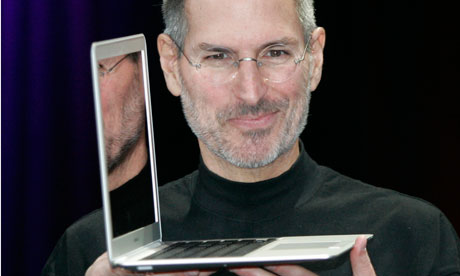
Dictator. Tyrant. Genius: Steve Jobs's ferocious perfectionism is the stuff of Silicon Valley legend. Very much the entrepreneur's entrepreneur, the charismatic, ruthlessly ambitious former Apple CEO has built a legion of devotees who worship Apple with nothing less than religious devotion – from fanboy geeks to design obsessives and business graduates and, more recently, an increasingly mainstream customer base.
Apple is the exception to every business rule. Where the trend is openness and collaboration, Apple is more proprietorial and closed than ever. Where tech businesses fail if they expand into content, Apple has come to redefine music and is a major player in digital books, TV and publishing. And where it is seen as far too risky for a business to depend on one all-powerful CEO, Jobs (left) has been that person for Apple, a company defined by his personality and vision. Dan Crow, who spent four years as Apple's senior engineering manager, saw the transformation after Jobs rejoined the company in 1996.
"Within 18 months he'd completely transformed Apple both internally and externally and it was really the force of his personality that did that."
Rivals pore over Apple's methods – from tiny product groups and strictly enforced secrecy to an internal "university" where company successes are analysed and the strategy reinforced by an academic. And behind all this is Jobs. As Wired's Frank Rose once wrote, he was "far more compelling and ultimately more successful than the string of glossy-tongued managers".
"Can anyone tell me what MobileMe is meant to do?" Jobs barked at a meeting in 2008. "So why the fuck doesn't it do that?" he went on, beginning a 30-minute tirade detailed by Fortune magazine. "You've tarnished Apple's reputation. You should hate each other for having let each other down."
In 2000, a meeting between Jobs and an education firm ended with Jobs screeching across the table: "You're shit! Your company's shit! It's nothing compared to mine!" his spittle flecking the table, according to the Boing Boing website.
Crow saw the infamous tyranny firsthand, working on development of the Quicktime video software where Jobs managed "every last pixel of the interface". His particular talents for marketing and his instinct for creating desirable products also come with an intimidating management style. "He's a perfectionist micromanager and will accept absolutely no compromise to his vision," Crow said.
"The flipside is that you end up building something extraordinary – our team ended up building elegant and refined software we didn't believe we were capable of building. Being part of that was career defining – he brings out the best in people."
Jobs began his second period of health-related medical leave more than 18 months ago, since when he has looked increasingly gaunt during select public appearances. Though doubtless a reflection of his tenacity and commitment to Apple, this carefully graduated exit has minimised any sudden dive in Apple's stock value and prepared shareholders for a succession. Even his departure has been micromanaged. Is Apple's future really entwined with Jobs's personality?
"Even when Steve isn't personally involved in a product, his philosophy is so well understood in the company that it pervades everything Apple does," said Crow.
"It's hard to see how that influence can remain at the level it is now because Steve is such a personality, and his influence is a very powerful tool in the company that is used to maintain standards.
"Although he's surrounded by very smart people from Tim Cook down, that influence will fade over time. Apple is a company founded in his image."

